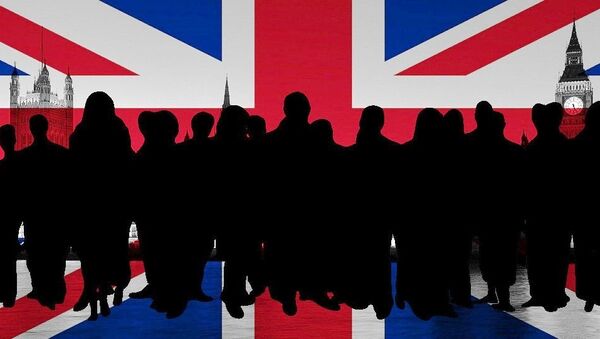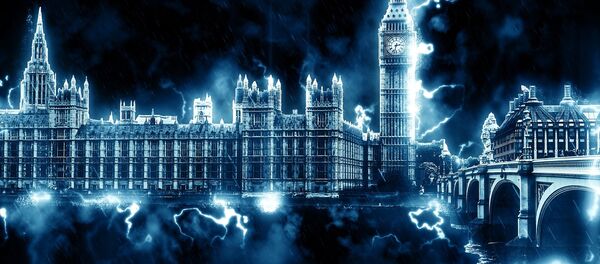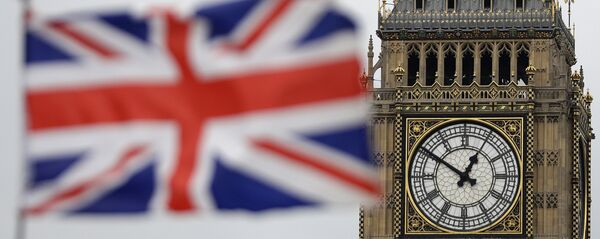LONDON (Sputnik) — A set of unpopular measures taken amid the ongoing campaign, as well as terrorist attacks targeting the country could result in weakening of Conservatives, losing their majority in the House of Commons and consequently the resignation of the Cabinet.
IMPULSIVE DECISION
Before announcing the vote on April 18, May had repeatedly stated that there would be no early elections in the country. The UK prime minister, obviously, later faced a storm of criticism against the backdrop of her inconsistency.
"This is not the Iron Lady – this is someone whose government is in chaos, chopping and changing all of the time," Scotland's First Minister Nicola Sturgeon told the BBC broadcaster about the change of May's position on the issue.
The prime minister gave reason for the change citing the need to unite the nation in front of the country's withdrawal from the European Union and the necessity to obtain a right granted by the nation to be engaged in the Brexit talks.
First of all, this is the pressure of her party fellows, opposing the so-called "hard Brexit" implying withdrawal of the nation not only from the European Union, but also from the EU single market and backing the settlement of problem issues related to the rights of EU citizens in the United Kingdom after Brexit.
In addition, May was not the leader of the party that won the majority of seats in 2015. She assumed the office after the resignation of David Cameron, who decided to step down after the Britons decided to leave the 28-nation bloc despite Cameron's campaigning against the move.
Yet another reason could be based on the plans of May to improve the results of the 2015 vote and to defeat the Labour Party weakened by an internal crisis.
According to the polls, in April, Conservatives were supported by almost half of the Britons, while less than a quarter of the voters planned to support the Labour politicians. However, by the early June, the situation has changed due to several reasons.
UNPOPULAR STEPS
The Conservative Party justified the proposal saying that people would be able to give at least 100,000 pounds to their inheritors.
The move had been widely criticized by the opposition parties. Labour leader Jermey Corbyn called the measure "dementia tax" and Tim Farron, Corbin's counterpart from the Liberal Democrats party, had accused the Conservatives of cruelty as for the old people.
The critical statements regarding the Conservatives' initiative forced the party to soften its stand on the issue.
"We will make sure nobody has to sell their family home to pay for care. We will make sure there is an absolute limit on what people need to pay. You will never have to go below £100,000 of your savings so you will always have something to pass on to your family," May said, as quoted by The Telegraph, soon after the publication of the party document.
The promises to tackle annual net migration down to "the tens of thousands" instead of the incumbent 273,000 have been given by the party for the recent seven years, while the problem is yet to be solved.
"[May] knows better than almost anyone that net migration — the number of people arriving, minus the number leaving — is not in the gift of government, subject as it is to the vagaries of the world economy. Moreover, this target has a perverse incentive, in that the more people you persuade to emigrate from the UK, the more likely you are to hit it," George Osborne, who was the UK chancellor in the Conservative Cabinet of Cameron, said in an article for the London Evening Standard newspaper.
The manifesto also pledged to control immigration from the European Union after Brexit that almost meant introduction of restrictions on freedom of movement.
The publication of the manifesto had resulted in gradual reduction of distance between the Conservative and the Labour parties, according to polls.
TERRORIST THREAT TO ELECTION RESULTS
A set of deadly terrorist attacks hit London in March and in June, while the city of Manchester was targeted in May. The two most recent attacks took place in the country after the prime minister had already announced the early election.
The attack that hit Manchester on May 22 resulted in a rapid narrowing of the gap between the two major UK parties. The trend maintained after the Saturday attack in the UK capital.
On Wednesday, the YouGov poll revealed that the gap between them was estimated at 3 percent, as 41 percent of voters voiced support to the Conservatives and 38 was ready to support the Labour Party. According to these figures, May's party could win 311 seats in the House of Commons and to lose the majority. Despite the fact that the polls released since then have shown the growth in support of the Conservative party, it could still lose seats.
In an interview with the ITV broadcaster following the deadly attacks, Corbyn called on May to resign as "there’s been calls made by a lot of very responsible people on this who are very worried that she was at the Home Office for all this time, presided over these cuts in police numbers and is now saying that we have a problem – yes, we do have a problem, we should never have cut the police numbers."
The bad situation had been made even worse as after the Manchester attack the country's authorities had increased the terror attack threat level up to the maximum and decreased it a week before the Saturday attack in the capital.






